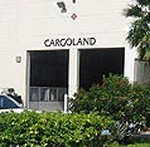 An article in today’s Miami Herald provides more details about the settlement agreement that we previously reported and under which freight forwarder Cargoland Air and Ocean Cargo, Inc. agreed to pay a fine of $36,000 to the Bureau of Industry and Security (“BIS”). The fine was paid in connection with an unlicensed shipment of police helmets to Venezuela. These new details, however, may raise more questions than they answer.
An article in today’s Miami Herald provides more details about the settlement agreement that we previously reported and under which freight forwarder Cargoland Air and Ocean Cargo, Inc. agreed to pay a fine of $36,000 to the Bureau of Industry and Security (“BIS”). The fine was paid in connection with an unlicensed shipment of police helmets to Venezuela. These new details, however, may raise more questions than they answer.
According to the article, Susan Olmo, the owner of Cargoland, had no idea a license was necessary:
Doral freight forwarder Susana Olmo shipped 210 riot helmets to Venezuela two years ago as a favor to a customer who had won a contract to outfit some of the country’s police.
It was only after the goods were on their way that Olmo learned that U.S. law required her to have a license to export the helmets. Olmo stopped the shipment and had the helmets returned to the United States, but that wasn’t enough to prevent her company from being fined $36,000 by the Commerce Department
Several things can be gleaned from this. First, it seems likely from this account that Olmo never bother to even consult the Commodity Control List before exporting the helmets. Accordingly, although our previous post on this complained that the ECCN involved might not give reasonable notice to a freight forwarder of what was covered, Olmo can’t claim that defense. Indeed, it is likely that BIS’s decision to whack her company even though she made every effort to get the helmets back was based on the absence of any evidence of an attempt to comply with BIS’s export rules.
I’m not quite sure what to make of Olmo’s claim that the export was “a favor to a customer.” Does Olmo export stuff with charge for customers she likes? And even if she did, I can’t find a personal favor defense in the Export Administration Regulations.
A settlement agreement with BIS doesn’t require that the exporter show remorse for the illegal shipment, and Olmo isn’t about to show any:
Olmo … is riled that she was fined $36,000. She said she lost about $20,000 shipping the helmets back to Miami. And she’s been stuck with about $15,500 worth of helmets she doesn’t know what to do with.
Uh, maybe she could send the helmets back to her customer. And what does she mean that she’s stuck with the helmets? Did she buy them? Was she the exporter of record or, in the current jargon, “U.S. principal party in interest”? Maybe what happened here is that her customer, knowing that a license to ship riot helmets to Venezuela would be difficult to obtain, duped her into buying and exporting the helmets, hence her claim that it was a favor.
‘They want to make an example of a small company,” Olmo said. “I don’t think it was fair. I didn’t make any money.”
She’s vowed she’ll never export anything again.
Her company is a freight forwarder and a non-vessel owning common carrier (“NVOCC”) that ships container loads to foreign countries. Is she saying that she’s shutting down her company? Or again, maybe this is consistent with my speculation that perhaps she was duped by her customer to be the exporter of record here. Even so, someone ought to tell Olmo that even where she is just the freight forwarder she is still involved in an export and required to comply with U.S. export laws.
 Permalink
Permalink
Copyright © 2008 Clif Burns. All Rights Reserved.
(No republication, syndication or use permitted without my consent.)

 Posted by
Posted by  Category:
Category: 

